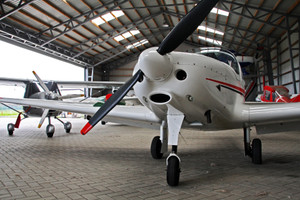Why Heat Waves Can Keep Planes Grounded
By on Jun 21st 2016
Sometimes planes can't handle that heat--and that might mean they get grounded.
While grounded flights are certainly the lesser challenge caused by extreme temperatures? it has many of us wondering why? Why do heat waves threaten flights?
Too hot to fly
Extreme heat poses challenges for airplanes-more so than extreme cold-due to the way heat affects the air around the plane (as the air is a very important element in the flying equation). To understand how air temperature affects the operation of aircraft, here is a very brief and simple explanation of how temperature affects the air itself:
Air density affects objects that are moving through airspace, so naturally airplanes are particularly affected by air density. Air's density depends on a number of factors, such as temperature, pressure, and water vapor. In the case of this current heat crisis, temperature in particular is affecting air density in a negative way.
In higher altitudes, the air is thinner; in higher temperatures, the air is also thinner due to the speeds at which the air molecules are moving (the nitrogen, oxygen, and other gasses that compose air). Simply put, hot molecules move much quicker than cold ones, and push against their surroundings (cold air, on the other hand, is more dense because the molecules don't move as much).
Why temperature matters
Now that we know that hot air is thin, we can look at how this might affect the operation of aircraft.
Extremely hot (and therefore thin) air can not only affect a plane's ability to take off, but can also damage the internal components, as well. While a lack of air density (-drag-) benefits, say, a racecar, the opposite is true with aircraft: when air density drastically decreases, the lifting force on the plane's wings decreases, the power produced by the engine decreases, and the thrust decreases.
Aircraft engines operate on the principal of thrust, which is the forward force which pushes the engine (and therefore plane) forward. Large volumes of air enter the engine; the air's power turns the turbine and when the air leaves, it pushes backward out of the engine and causes the plane to move forward.
When air temperatures reach such extremes, the lower density actually means that less air flows through the engine, meaning there's less fuel efficiency, as well as insufficient thrust to lift the plane off the ground or land it.
Heat regulations
FAA regulations prohibit planes from taking off or landing in temperatures higher than 120 degrees Fahrenheit, due to the associated risks. Smaller regional planes are certified to at least 118 degrees, while larger planes (such as most Boeing jets) are build to operate in higher temperatures, upwards of 126 degrees.
Pilots can compensate in high temperatures by using a higher thrust (to a point). Longer runways can also help aircraft operate in higher temperature environments, as can lightening the aircraft load, although these measures can only go so far. Safety is paramount in the decision whether to fly a plane or not, which is why airlines cancel flights when temperatures reach or exceed these operating certifications.
So if you're planning on flying in or out of the areas affected by this massive heat wave, be aware that regional planes may be grounded if temperatures remain high.
Sources:
http://usatoday30.usatoday.com/weather/wdensity.ht...
https://www.grc.nasa.gov/www/k-12/UEET/StudentSite...
http://www.cntraveler.com/stories/2016-06-20/its-s...







